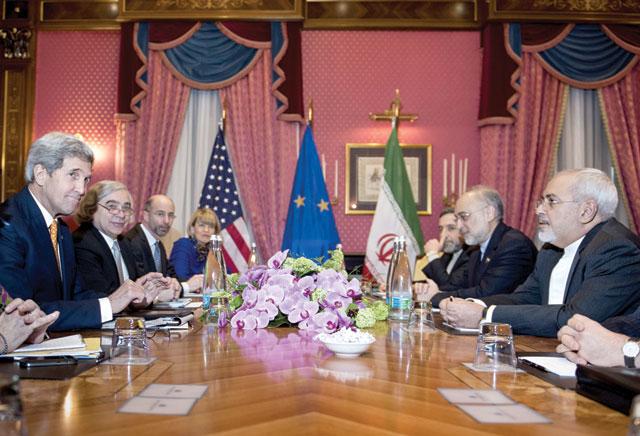You are here
‘Ways to go’ in Iran nuclear talks as time runs short
By AFP - Mar 17,2015 - Last updated at Mar 17,2015
LAUSANNE — The US hunkered down Tuesday with Iran for crunch talks while warning that key disagreements remain ahead of a March 31 deadline to agree the outlines of a major nuclear deal.
"There is no way around it, we still have a ways to go," a senior US official involved in the talks in the Swiss lakeside city of Lausanne said Tuesday.
The deal being sought by US Secretary of State John Kerry and his Iranian counterpart will, they hope, convince the world that Iran will not develop nuclear weapons under the guise of its civilian programme.
The Islamic republic, which has seen its relations with the West thaw somewhat since President Hassan Rouhani replaced Mahmoud Ahmadinejad in 2013, strenuously denies wanting the bomb.
The accord would involve Iran agreeing to scale down its nuclear activities to within strict limits in return for relief from sanctions suffocating its economy.
If they manage it and the accord holds, both sides hope it will end a 12-year stand-off and potentially help normalise Iran's international relations at a particularly volatile time in the Middle East.
"Iran still needs to make some very tough and necessary choices to address the significant concerns that remain about its nuclear programme," a second US official said Monday.
"We're trying to get there. But quite frankly, we still do not know if we will be able to," the official said, likening the months of negotiations to a "rollercoaster".
Iranian Foreign Minister Mohammad Javad Zarif and Kerry held almost five hours of talks on Monday before Zarif went to and from Brussels — while Kerry went for a bike ride — to meet European foreign ministers and EU foreign policy chief Federica Mogherini.
Zarif and Kerry met again on Tuesday morning. Political directors from the other five powers involved — Russia, China, Britain, France and Germany — began arriving in Lausanne on Tuesday and were due to meet on Wednesday, the EU said.
US lawmakers
Critics in the United States and in Iran's arch foe Israel, widely assumed to have nuclear weapons itself, fear that the mooted restrictions on Iran's nuclear programme won't go far enough.
In Washington a political storm is raging with 47 Republican senators last week writing to Iran's leaders telling them that Congress could alter any deal and that a future president could tear it up.
US President Barack Obama, a Democrat, is also fighting to stop the Republicans bringing new legislation that would force him to submit any deal to Congress for approval.
In Iran though, parliamentary speaker Ali Larijani said Monday that lawmakers would not block any deal as long as it is approved by supreme leader Ayatollah Ali Khamenei.
"We don't have problems like those in the United States," Larijani said.
Two deadlines to get a deal in July and November were missed but the Obama administration can hardly afford to extend yet again.
What might emerge in Lausanne by the end of the month — or possibly this week — is unclear, but a "concrete understanding" is crucial, expert Ali Vaez from the International Crisis Group told AFP.
"If there is an agreement [this month] I don't see how it can be meaningful without some quantitive measures," the first US official said.
Complex deal
Officials on both sides say that some progress has been made in what would be a highly complex agreement, but that crucial gaps remain.
These include the scale of Iran's uranium enrichment capacities — which can make nuclear fuel but also the core of a bomb — the accord's duration and the pace at which sanctions on Iran would be lifted.
"We need clarity on the way in which sanctions will be lifted and what the guarantees will be for applying the deal," Zarif said Sunday.
Related Articles
The United States and Iran resumed negotiations on Thursday aimed at clinching a nuclear deal before a March 31 deadline, and officials close to the talks said some kind of preliminary agreement between Tehran and six powers was possible.
Iran nuclear talks hung in the balance Monday with a senior US official saying it remained unclear whether the outlines of a deal could be agreed by a March 31 deadline.
After marathon negotiations, the United States, Iran and five other world powers announced a deal Thursday outlining limits on Iran's nuclear programme so it cannot lead to atomic weapons, directing negotiators toward a comprehensive agreement within three months.












